Management Accounting Report: Finance Module, Semester 1
VerifiedAdded on 2020/11/06
|17
|3594
|41
Report
AI Summary
This report provides a comprehensive overview of management accounting, exploring its role in organizational decision-making and strategic planning. It delves into the core concepts of management accounting systems, explaining essential requirements and different reporting methods. The report examines the key differences between management and financial accounting, highlighting areas of overlap. Furthermore, it applies various management accounting techniques, including cost analysis, marginal costing, and absorption costing, to prepare income statements. The report also covers break-even analysis and net profit calculations, emphasizing their significance in financial planning. Through practical examples and case studies, the report illustrates the application of these techniques in real-world scenarios, offering valuable insights for students and professionals seeking to enhance their understanding of management accounting principles and practices.
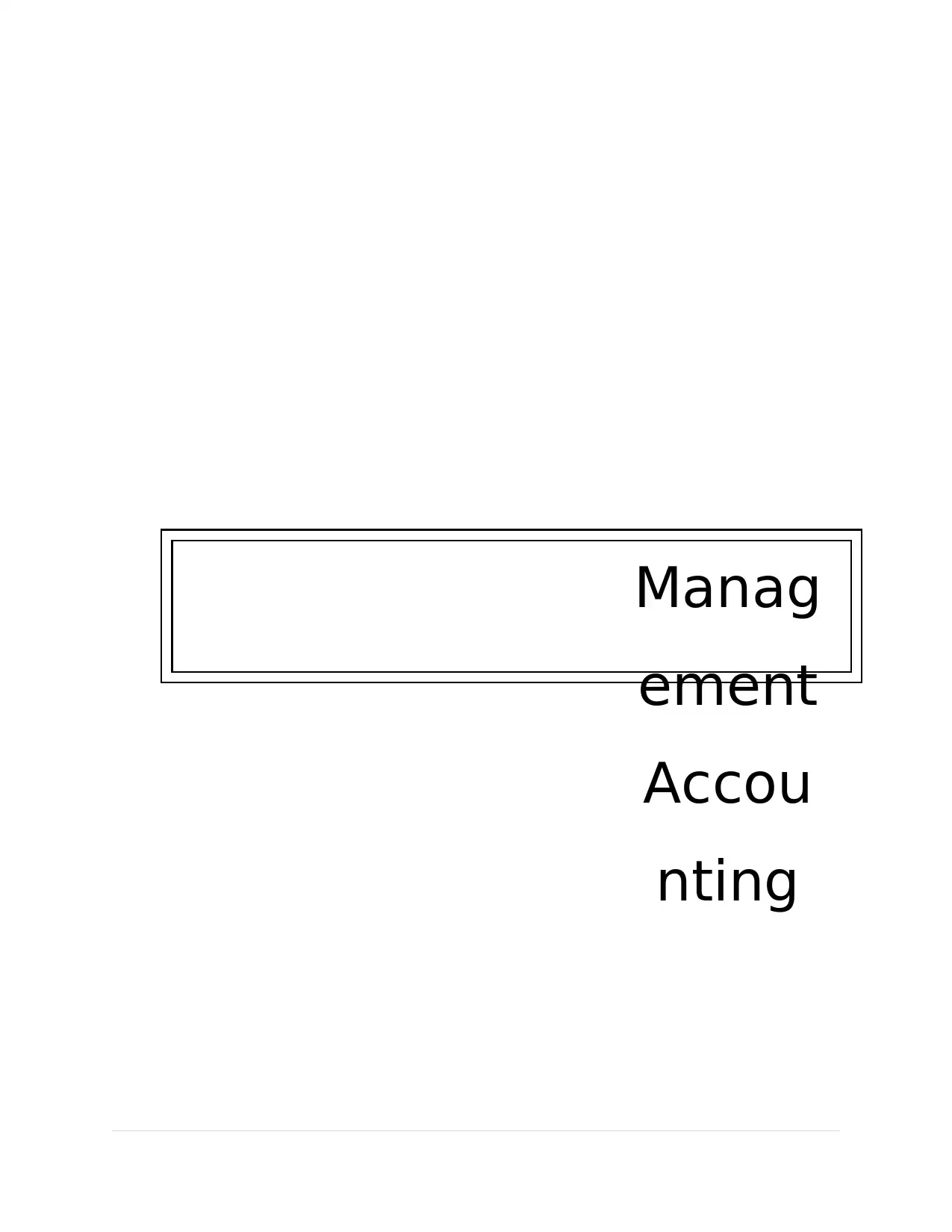
Manag
ement
Accou
nting
ement
Accou
nting
Paraphrase This Document
Need a fresh take? Get an instant paraphrase of this document with our AI Paraphraser
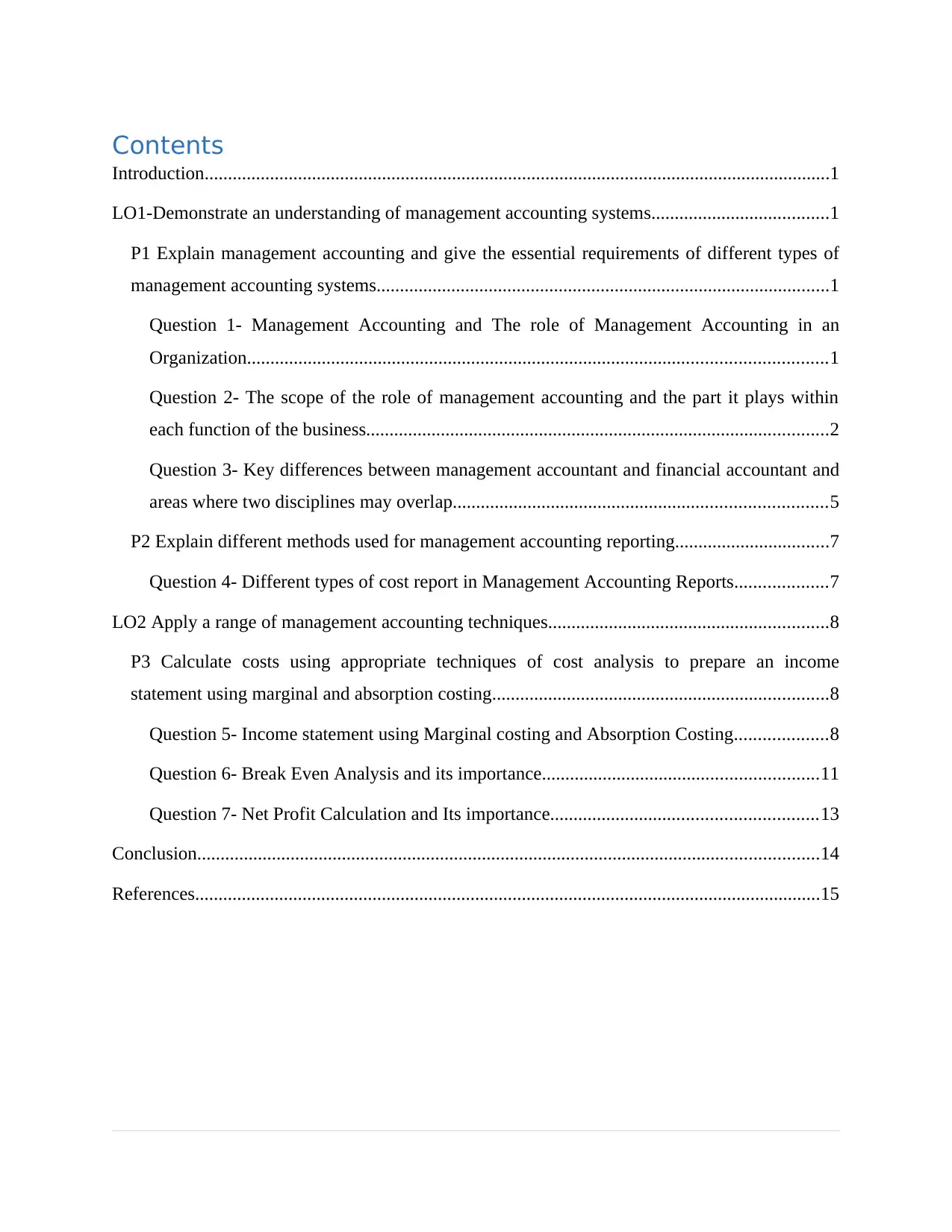
Contents
Introduction......................................................................................................................................1
LO1-Demonstrate an understanding of management accounting systems......................................1
P1 Explain management accounting and give the essential requirements of different types of
management accounting systems.................................................................................................1
Question 1- Management Accounting and The role of Management Accounting in an
Organization............................................................................................................................1
Question 2- The scope of the role of management accounting and the part it plays within
each function of the business...................................................................................................2
Question 3- Key differences between management accountant and financial accountant and
areas where two disciplines may overlap................................................................................5
P2 Explain different methods used for management accounting reporting.................................7
Question 4- Different types of cost report in Management Accounting Reports....................7
LO2 Apply a range of management accounting techniques............................................................8
P3 Calculate costs using appropriate techniques of cost analysis to prepare an income
statement using marginal and absorption costing........................................................................8
Question 5- Income statement using Marginal costing and Absorption Costing....................8
Question 6- Break Even Analysis and its importance...........................................................11
Question 7- Net Profit Calculation and Its importance.........................................................13
Conclusion.....................................................................................................................................14
References......................................................................................................................................15
Introduction......................................................................................................................................1
LO1-Demonstrate an understanding of management accounting systems......................................1
P1 Explain management accounting and give the essential requirements of different types of
management accounting systems.................................................................................................1
Question 1- Management Accounting and The role of Management Accounting in an
Organization............................................................................................................................1
Question 2- The scope of the role of management accounting and the part it plays within
each function of the business...................................................................................................2
Question 3- Key differences between management accountant and financial accountant and
areas where two disciplines may overlap................................................................................5
P2 Explain different methods used for management accounting reporting.................................7
Question 4- Different types of cost report in Management Accounting Reports....................7
LO2 Apply a range of management accounting techniques............................................................8
P3 Calculate costs using appropriate techniques of cost analysis to prepare an income
statement using marginal and absorption costing........................................................................8
Question 5- Income statement using Marginal costing and Absorption Costing....................8
Question 6- Break Even Analysis and its importance...........................................................11
Question 7- Net Profit Calculation and Its importance.........................................................13
Conclusion.....................................................................................................................................14
References......................................................................................................................................15
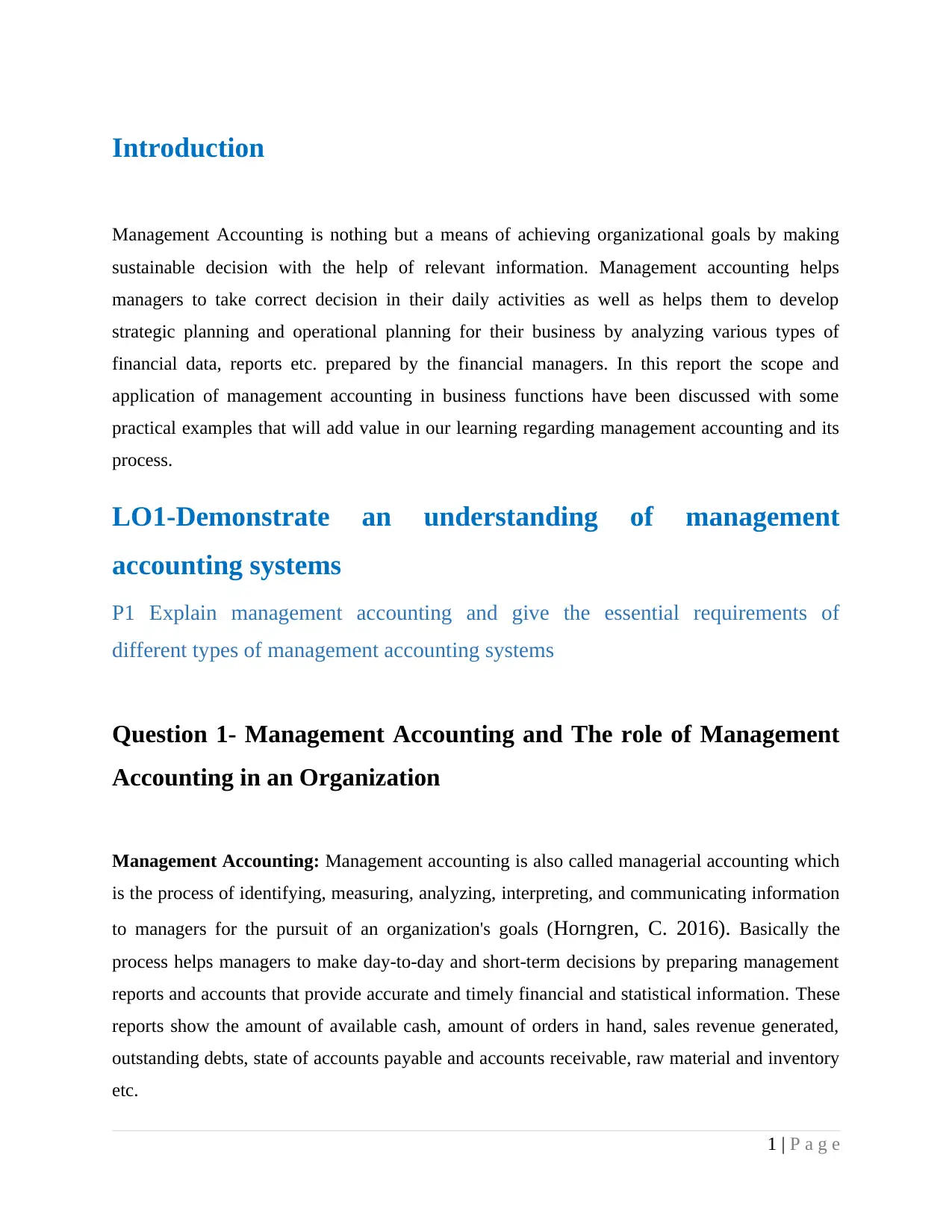
Introduction
Management Accounting is nothing but a means of achieving organizational goals by making
sustainable decision with the help of relevant information. Management accounting helps
managers to take correct decision in their daily activities as well as helps them to develop
strategic planning and operational planning for their business by analyzing various types of
financial data, reports etc. prepared by the financial managers. In this report the scope and
application of management accounting in business functions have been discussed with some
practical examples that will add value in our learning regarding management accounting and its
process.
LO1-Demonstrate an understanding of management
accounting systems
P1 Explain management accounting and give the essential requirements of
different types of management accounting systems
Question 1- Management Accounting and The role of Management
Accounting in an Organization
Management Accounting: Management accounting is also called managerial accounting which
is the process of identifying, measuring, analyzing, interpreting, and communicating information
to managers for the pursuit of an organization's goals (Horngren, C. 2016). Basically the
process helps managers to make day-to-day and short-term decisions by preparing management
reports and accounts that provide accurate and timely financial and statistical information. These
reports show the amount of available cash, amount of orders in hand, sales revenue generated,
outstanding debts, state of accounts payable and accounts receivable, raw material and inventory
etc.
1 | P a g e
Management Accounting is nothing but a means of achieving organizational goals by making
sustainable decision with the help of relevant information. Management accounting helps
managers to take correct decision in their daily activities as well as helps them to develop
strategic planning and operational planning for their business by analyzing various types of
financial data, reports etc. prepared by the financial managers. In this report the scope and
application of management accounting in business functions have been discussed with some
practical examples that will add value in our learning regarding management accounting and its
process.
LO1-Demonstrate an understanding of management
accounting systems
P1 Explain management accounting and give the essential requirements of
different types of management accounting systems
Question 1- Management Accounting and The role of Management
Accounting in an Organization
Management Accounting: Management accounting is also called managerial accounting which
is the process of identifying, measuring, analyzing, interpreting, and communicating information
to managers for the pursuit of an organization's goals (Horngren, C. 2016). Basically the
process helps managers to make day-to-day and short-term decisions by preparing management
reports and accounts that provide accurate and timely financial and statistical information. These
reports show the amount of available cash, amount of orders in hand, sales revenue generated,
outstanding debts, state of accounts payable and accounts receivable, raw material and inventory
etc.
1 | P a g e
⊘ This is a preview!⊘
Do you want full access?
Subscribe today to unlock all pages.

Trusted by 1+ million students worldwide
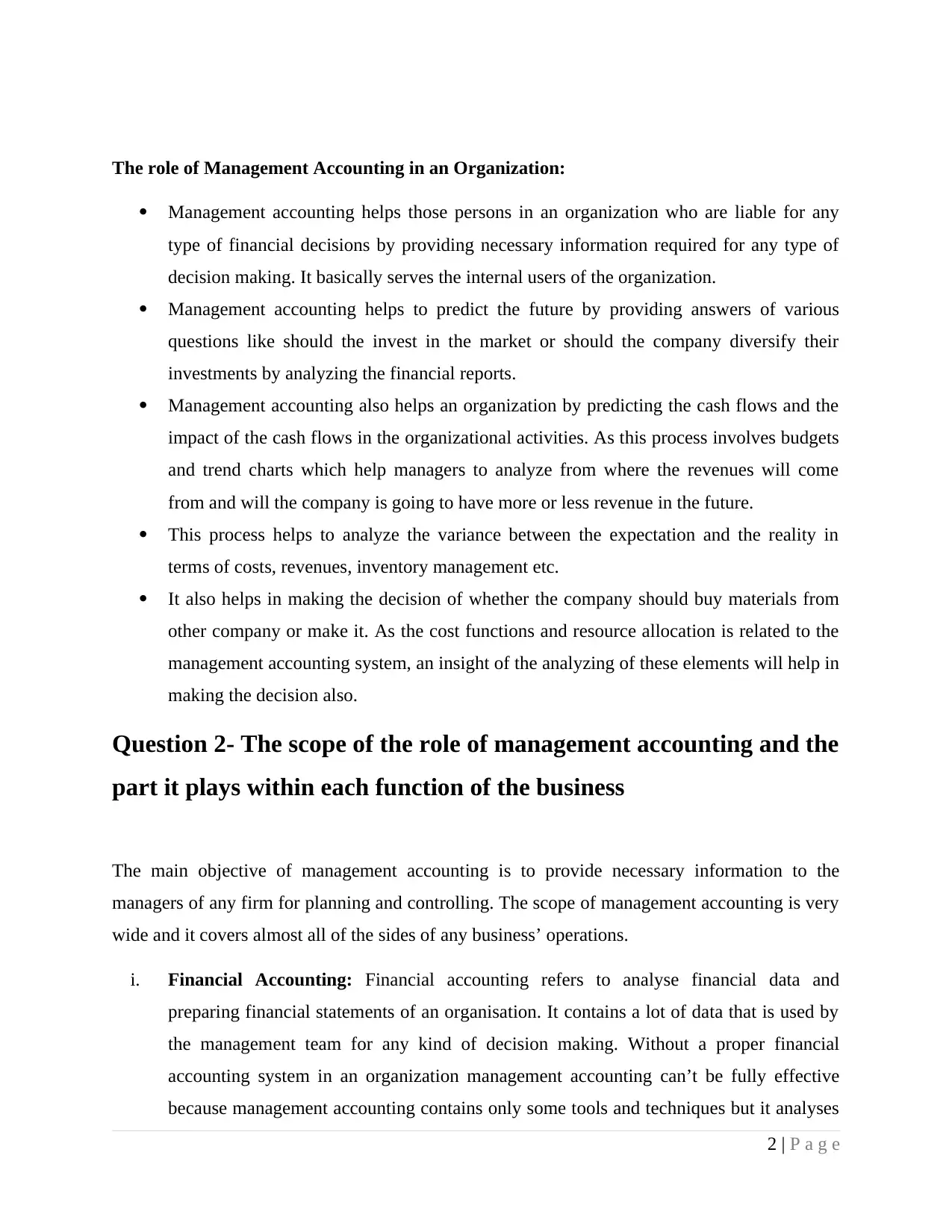
The role of Management Accounting in an Organization:
Management accounting helps those persons in an organization who are liable for any
type of financial decisions by providing necessary information required for any type of
decision making. It basically serves the internal users of the organization.
Management accounting helps to predict the future by providing answers of various
questions like should the invest in the market or should the company diversify their
investments by analyzing the financial reports.
Management accounting also helps an organization by predicting the cash flows and the
impact of the cash flows in the organizational activities. As this process involves budgets
and trend charts which help managers to analyze from where the revenues will come
from and will the company is going to have more or less revenue in the future.
This process helps to analyze the variance between the expectation and the reality in
terms of costs, revenues, inventory management etc.
It also helps in making the decision of whether the company should buy materials from
other company or make it. As the cost functions and resource allocation is related to the
management accounting system, an insight of the analyzing of these elements will help in
making the decision also.
Question 2- The scope of the role of management accounting and the
part it plays within each function of the business
The main objective of management accounting is to provide necessary information to the
managers of any firm for planning and controlling. The scope of management accounting is very
wide and it covers almost all of the sides of any business’ operations.
i. Financial Accounting: Financial accounting refers to analyse financial data and
preparing financial statements of an organisation. It contains a lot of data that is used by
the management team for any kind of decision making. Without a proper financial
accounting system in an organization management accounting can’t be fully effective
because management accounting contains only some tools and techniques but it analyses
2 | P a g e
Management accounting helps those persons in an organization who are liable for any
type of financial decisions by providing necessary information required for any type of
decision making. It basically serves the internal users of the organization.
Management accounting helps to predict the future by providing answers of various
questions like should the invest in the market or should the company diversify their
investments by analyzing the financial reports.
Management accounting also helps an organization by predicting the cash flows and the
impact of the cash flows in the organizational activities. As this process involves budgets
and trend charts which help managers to analyze from where the revenues will come
from and will the company is going to have more or less revenue in the future.
This process helps to analyze the variance between the expectation and the reality in
terms of costs, revenues, inventory management etc.
It also helps in making the decision of whether the company should buy materials from
other company or make it. As the cost functions and resource allocation is related to the
management accounting system, an insight of the analyzing of these elements will help in
making the decision also.
Question 2- The scope of the role of management accounting and the
part it plays within each function of the business
The main objective of management accounting is to provide necessary information to the
managers of any firm for planning and controlling. The scope of management accounting is very
wide and it covers almost all of the sides of any business’ operations.
i. Financial Accounting: Financial accounting refers to analyse financial data and
preparing financial statements of an organisation. It contains a lot of data that is used by
the management team for any kind of decision making. Without a proper financial
accounting system in an organization management accounting can’t be fully effective
because management accounting contains only some tools and techniques but it analyses
2 | P a g e
Paraphrase This Document
Need a fresh take? Get an instant paraphrase of this document with our AI Paraphraser
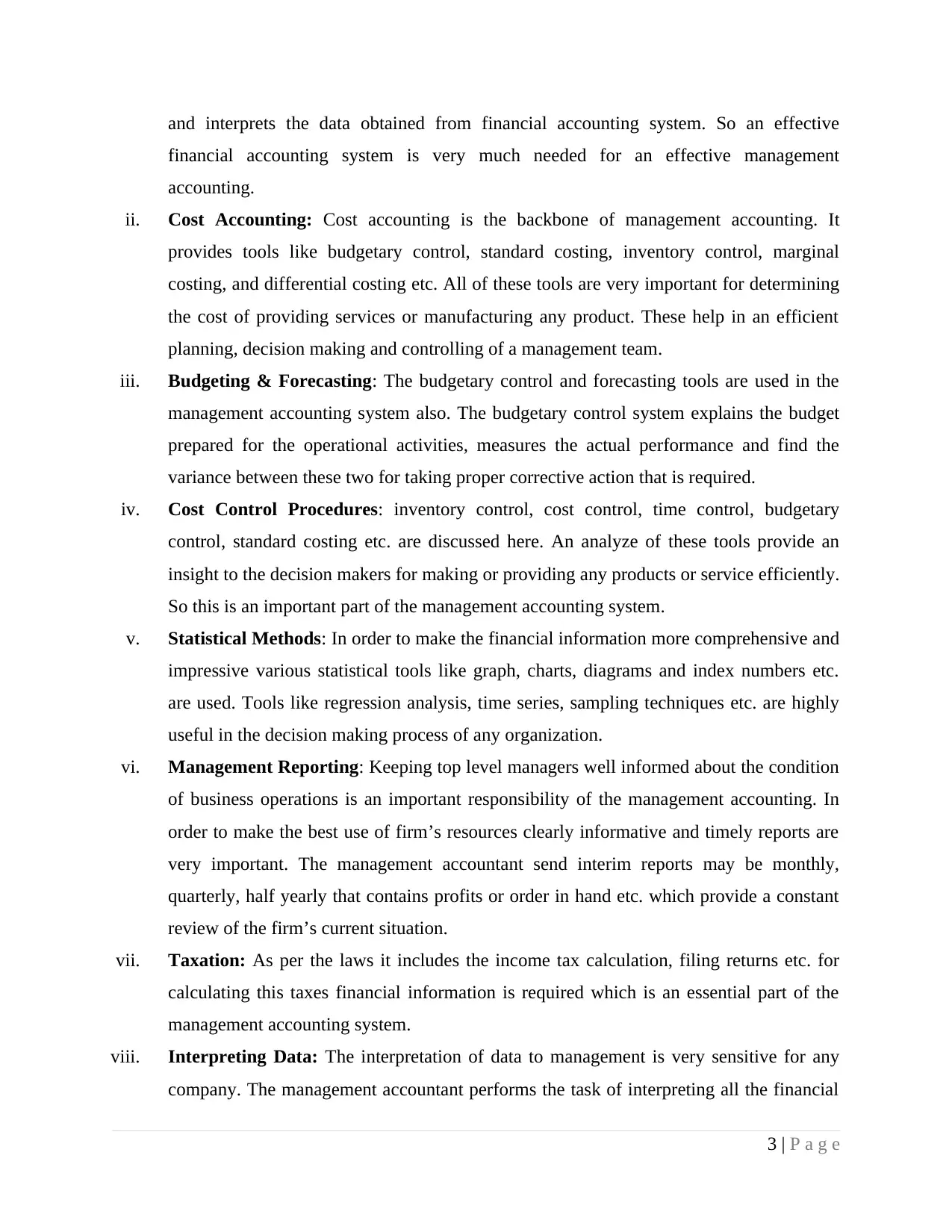
and interprets the data obtained from financial accounting system. So an effective
financial accounting system is very much needed for an effective management
accounting.
ii. Cost Accounting: Cost accounting is the backbone of management accounting. It
provides tools like budgetary control, standard costing, inventory control, marginal
costing, and differential costing etc. All of these tools are very important for determining
the cost of providing services or manufacturing any product. These help in an efficient
planning, decision making and controlling of a management team.
iii. Budgeting & Forecasting: The budgetary control and forecasting tools are used in the
management accounting system also. The budgetary control system explains the budget
prepared for the operational activities, measures the actual performance and find the
variance between these two for taking proper corrective action that is required.
iv. Cost Control Procedures: inventory control, cost control, time control, budgetary
control, standard costing etc. are discussed here. An analyze of these tools provide an
insight to the decision makers for making or providing any products or service efficiently.
So this is an important part of the management accounting system.
v. Statistical Methods: In order to make the financial information more comprehensive and
impressive various statistical tools like graph, charts, diagrams and index numbers etc.
are used. Tools like regression analysis, time series, sampling techniques etc. are highly
useful in the decision making process of any organization.
vi. Management Reporting: Keeping top level managers well informed about the condition
of business operations is an important responsibility of the management accounting. In
order to make the best use of firm’s resources clearly informative and timely reports are
very important. The management accountant send interim reports may be monthly,
quarterly, half yearly that contains profits or order in hand etc. which provide a constant
review of the firm’s current situation.
vii. Taxation: As per the laws it includes the income tax calculation, filing returns etc. for
calculating this taxes financial information is required which is an essential part of the
management accounting system.
viii. Interpreting Data: The interpretation of data to management is very sensitive for any
company. The management accountant performs the task of interpreting all the financial
3 | P a g e
financial accounting system is very much needed for an effective management
accounting.
ii. Cost Accounting: Cost accounting is the backbone of management accounting. It
provides tools like budgetary control, standard costing, inventory control, marginal
costing, and differential costing etc. All of these tools are very important for determining
the cost of providing services or manufacturing any product. These help in an efficient
planning, decision making and controlling of a management team.
iii. Budgeting & Forecasting: The budgetary control and forecasting tools are used in the
management accounting system also. The budgetary control system explains the budget
prepared for the operational activities, measures the actual performance and find the
variance between these two for taking proper corrective action that is required.
iv. Cost Control Procedures: inventory control, cost control, time control, budgetary
control, standard costing etc. are discussed here. An analyze of these tools provide an
insight to the decision makers for making or providing any products or service efficiently.
So this is an important part of the management accounting system.
v. Statistical Methods: In order to make the financial information more comprehensive and
impressive various statistical tools like graph, charts, diagrams and index numbers etc.
are used. Tools like regression analysis, time series, sampling techniques etc. are highly
useful in the decision making process of any organization.
vi. Management Reporting: Keeping top level managers well informed about the condition
of business operations is an important responsibility of the management accounting. In
order to make the best use of firm’s resources clearly informative and timely reports are
very important. The management accountant send interim reports may be monthly,
quarterly, half yearly that contains profits or order in hand etc. which provide a constant
review of the firm’s current situation.
vii. Taxation: As per the laws it includes the income tax calculation, filing returns etc. for
calculating this taxes financial information is required which is an essential part of the
management accounting system.
viii. Interpreting Data: The interpretation of data to management is very sensitive for any
company. The management accountant performs the task of interpreting all the financial
3 | P a g e
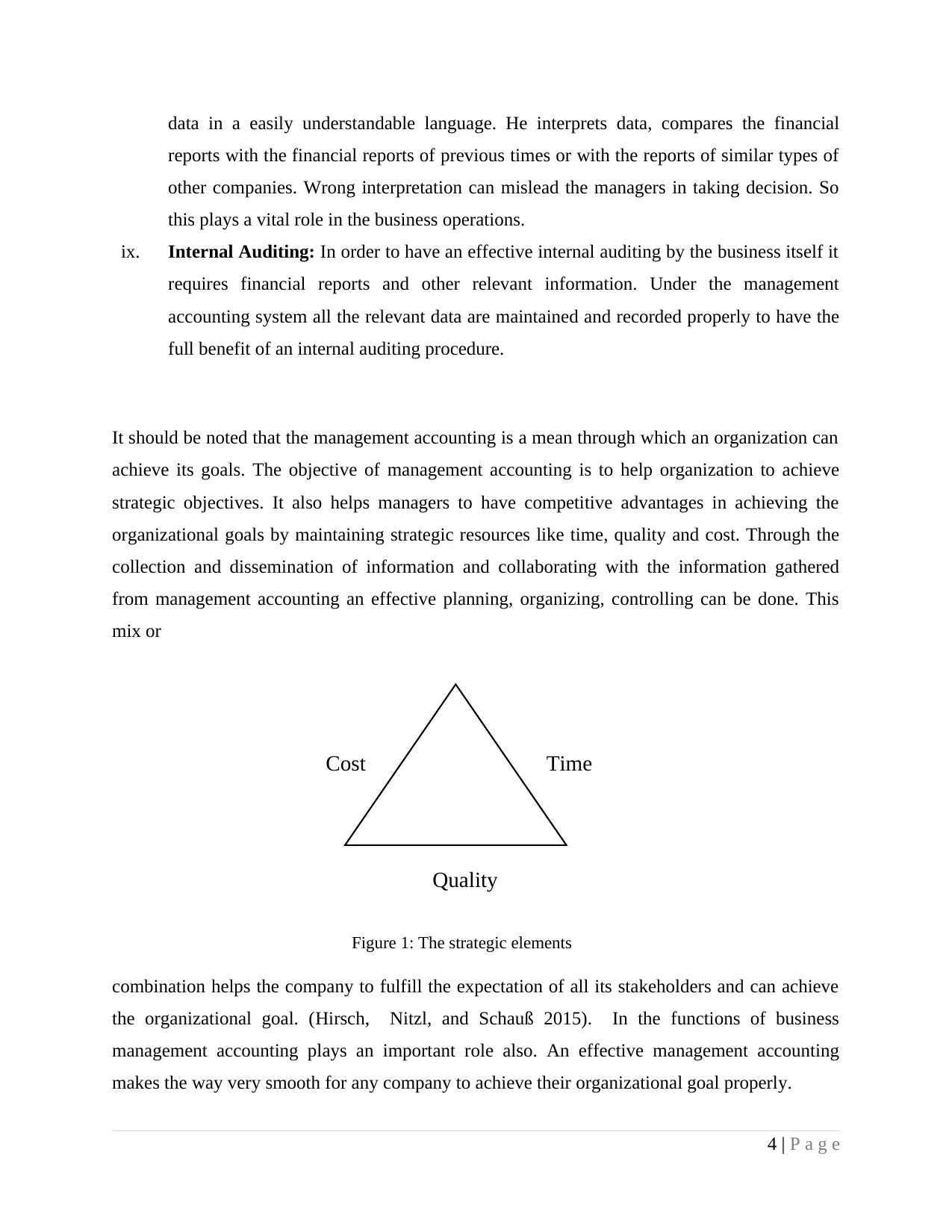
data in a easily understandable language. He interprets data, compares the financial
reports with the financial reports of previous times or with the reports of similar types of
other companies. Wrong interpretation can mislead the managers in taking decision. So
this plays a vital role in the business operations.
ix. Internal Auditing: In order to have an effective internal auditing by the business itself it
requires financial reports and other relevant information. Under the management
accounting system all the relevant data are maintained and recorded properly to have the
full benefit of an internal auditing procedure.
It should be noted that the management accounting is a mean through which an organization can
achieve its goals. The objective of management accounting is to help organization to achieve
strategic objectives. It also helps managers to have competitive advantages in achieving the
organizational goals by maintaining strategic resources like time, quality and cost. Through the
collection and dissemination of information and collaborating with the information gathered
from management accounting an effective planning, organizing, controlling can be done. This
mix or
Figure 1: The strategic elements
combination helps the company to fulfill the expectation of all its stakeholders and can achieve
the organizational goal. (Hirsch, Nitzl, and Schauß 2015). In the functions of business
management accounting plays an important role also. An effective management accounting
makes the way very smooth for any company to achieve their organizational goal properly.
4 | P a g e
Cost Time
Quality
reports with the financial reports of previous times or with the reports of similar types of
other companies. Wrong interpretation can mislead the managers in taking decision. So
this plays a vital role in the business operations.
ix. Internal Auditing: In order to have an effective internal auditing by the business itself it
requires financial reports and other relevant information. Under the management
accounting system all the relevant data are maintained and recorded properly to have the
full benefit of an internal auditing procedure.
It should be noted that the management accounting is a mean through which an organization can
achieve its goals. The objective of management accounting is to help organization to achieve
strategic objectives. It also helps managers to have competitive advantages in achieving the
organizational goals by maintaining strategic resources like time, quality and cost. Through the
collection and dissemination of information and collaborating with the information gathered
from management accounting an effective planning, organizing, controlling can be done. This
mix or
Figure 1: The strategic elements
combination helps the company to fulfill the expectation of all its stakeholders and can achieve
the organizational goal. (Hirsch, Nitzl, and Schauß 2015). In the functions of business
management accounting plays an important role also. An effective management accounting
makes the way very smooth for any company to achieve their organizational goal properly.
4 | P a g e
Cost Time
Quality
⊘ This is a preview!⊘
Do you want full access?
Subscribe today to unlock all pages.

Trusted by 1+ million students worldwide
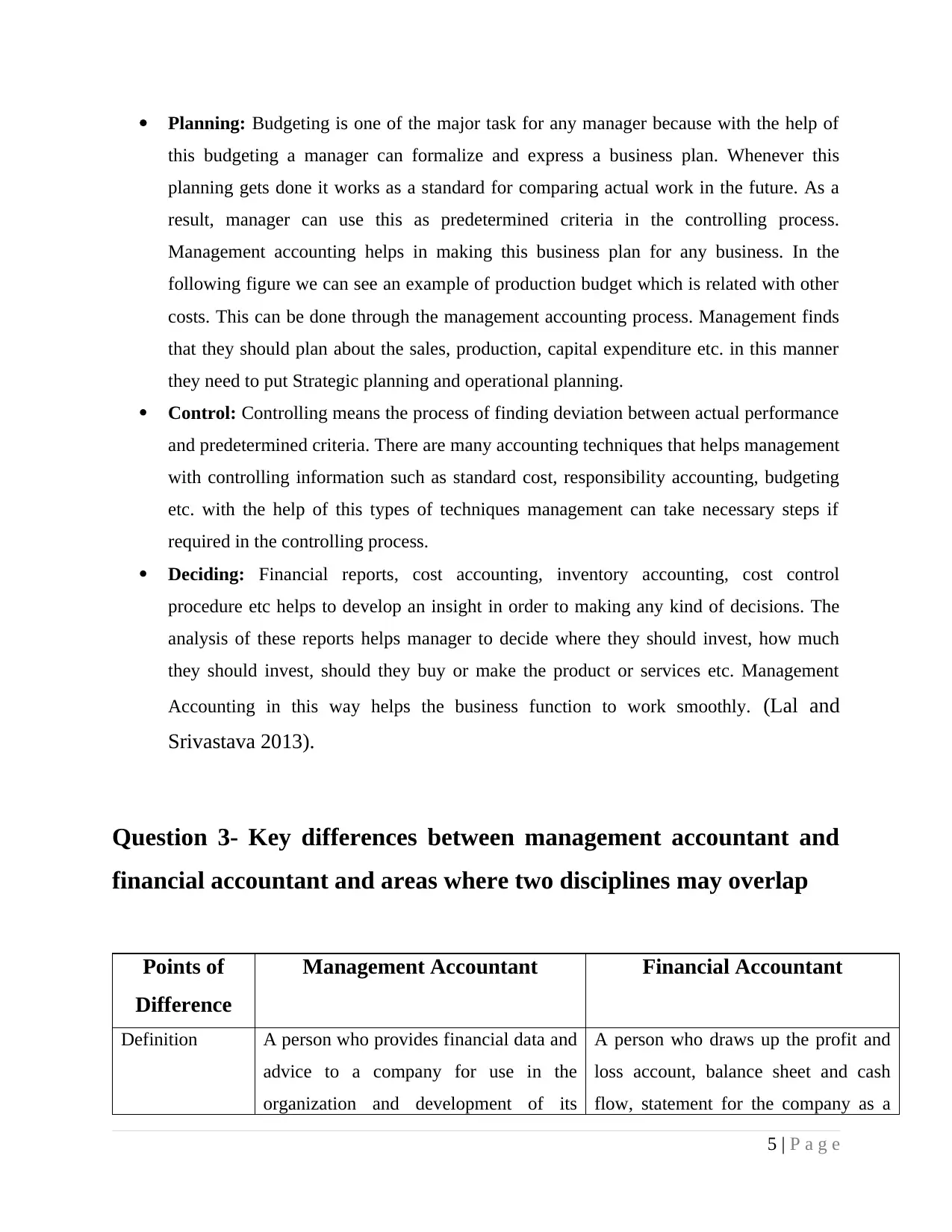
Planning: Budgeting is one of the major task for any manager because with the help of
this budgeting a manager can formalize and express a business plan. Whenever this
planning gets done it works as a standard for comparing actual work in the future. As a
result, manager can use this as predetermined criteria in the controlling process.
Management accounting helps in making this business plan for any business. In the
following figure we can see an example of production budget which is related with other
costs. This can be done through the management accounting process. Management finds
that they should plan about the sales, production, capital expenditure etc. in this manner
they need to put Strategic planning and operational planning.
Control: Controlling means the process of finding deviation between actual performance
and predetermined criteria. There are many accounting techniques that helps management
with controlling information such as standard cost, responsibility accounting, budgeting
etc. with the help of this types of techniques management can take necessary steps if
required in the controlling process.
Deciding: Financial reports, cost accounting, inventory accounting, cost control
procedure etc helps to develop an insight in order to making any kind of decisions. The
analysis of these reports helps manager to decide where they should invest, how much
they should invest, should they buy or make the product or services etc. Management
Accounting in this way helps the business function to work smoothly. (Lal and
Srivastava 2013).
Question 3- Key differences between management accountant and
financial accountant and areas where two disciplines may overlap
Points of
Difference
Management Accountant Financial Accountant
Definition A person who provides financial data and
advice to a company for use in the
organization and development of its
A person who draws up the profit and
loss account, balance sheet and cash
flow, statement for the company as a
5 | P a g e
this budgeting a manager can formalize and express a business plan. Whenever this
planning gets done it works as a standard for comparing actual work in the future. As a
result, manager can use this as predetermined criteria in the controlling process.
Management accounting helps in making this business plan for any business. In the
following figure we can see an example of production budget which is related with other
costs. This can be done through the management accounting process. Management finds
that they should plan about the sales, production, capital expenditure etc. in this manner
they need to put Strategic planning and operational planning.
Control: Controlling means the process of finding deviation between actual performance
and predetermined criteria. There are many accounting techniques that helps management
with controlling information such as standard cost, responsibility accounting, budgeting
etc. with the help of this types of techniques management can take necessary steps if
required in the controlling process.
Deciding: Financial reports, cost accounting, inventory accounting, cost control
procedure etc helps to develop an insight in order to making any kind of decisions. The
analysis of these reports helps manager to decide where they should invest, how much
they should invest, should they buy or make the product or services etc. Management
Accounting in this way helps the business function to work smoothly. (Lal and
Srivastava 2013).
Question 3- Key differences between management accountant and
financial accountant and areas where two disciplines may overlap
Points of
Difference
Management Accountant Financial Accountant
Definition A person who provides financial data and
advice to a company for use in the
organization and development of its
A person who draws up the profit and
loss account, balance sheet and cash
flow, statement for the company as a
5 | P a g e
Paraphrase This Document
Need a fresh take? Get an instant paraphrase of this document with our AI Paraphraser
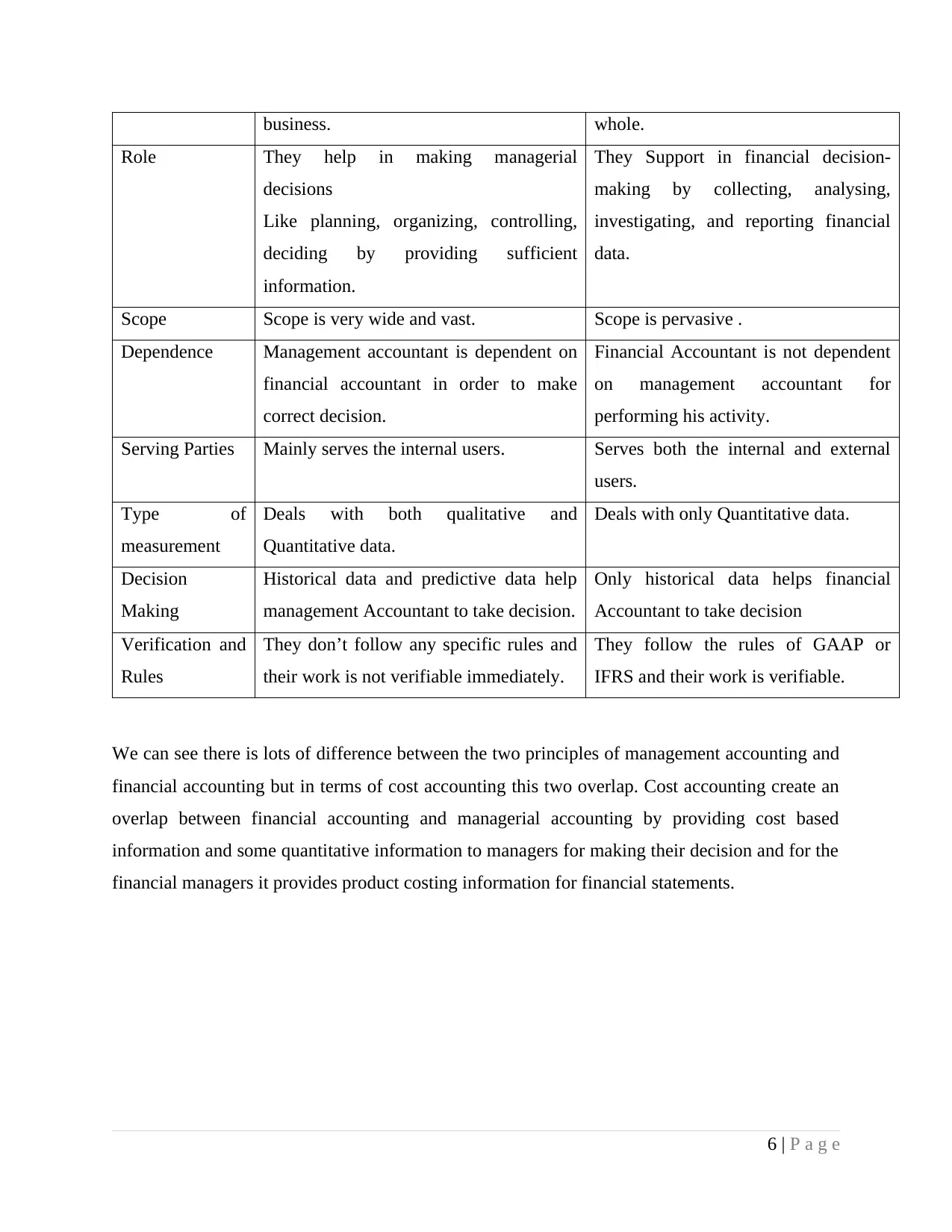
business. whole.
Role They help in making managerial
decisions
Like planning, organizing, controlling,
deciding by providing sufficient
information.
They Support in financial decision-
making by collecting, analysing,
investigating, and reporting financial
data.
Scope Scope is very wide and vast. Scope is pervasive .
Dependence Management accountant is dependent on
financial accountant in order to make
correct decision.
Financial Accountant is not dependent
on management accountant for
performing his activity.
Serving Parties Mainly serves the internal users. Serves both the internal and external
users.
Type of
measurement
Deals with both qualitative and
Quantitative data.
Deals with only Quantitative data.
Decision
Making
Historical data and predictive data help
management Accountant to take decision.
Only historical data helps financial
Accountant to take decision
Verification and
Rules
They don’t follow any specific rules and
their work is not verifiable immediately.
They follow the rules of GAAP or
IFRS and their work is verifiable.
We can see there is lots of difference between the two principles of management accounting and
financial accounting but in terms of cost accounting this two overlap. Cost accounting create an
overlap between financial accounting and managerial accounting by providing cost based
information and some quantitative information to managers for making their decision and for the
financial managers it provides product costing information for financial statements.
6 | P a g e
Role They help in making managerial
decisions
Like planning, organizing, controlling,
deciding by providing sufficient
information.
They Support in financial decision-
making by collecting, analysing,
investigating, and reporting financial
data.
Scope Scope is very wide and vast. Scope is pervasive .
Dependence Management accountant is dependent on
financial accountant in order to make
correct decision.
Financial Accountant is not dependent
on management accountant for
performing his activity.
Serving Parties Mainly serves the internal users. Serves both the internal and external
users.
Type of
measurement
Deals with both qualitative and
Quantitative data.
Deals with only Quantitative data.
Decision
Making
Historical data and predictive data help
management Accountant to take decision.
Only historical data helps financial
Accountant to take decision
Verification and
Rules
They don’t follow any specific rules and
their work is not verifiable immediately.
They follow the rules of GAAP or
IFRS and their work is verifiable.
We can see there is lots of difference between the two principles of management accounting and
financial accounting but in terms of cost accounting this two overlap. Cost accounting create an
overlap between financial accounting and managerial accounting by providing cost based
information and some quantitative information to managers for making their decision and for the
financial managers it provides product costing information for financial statements.
6 | P a g e
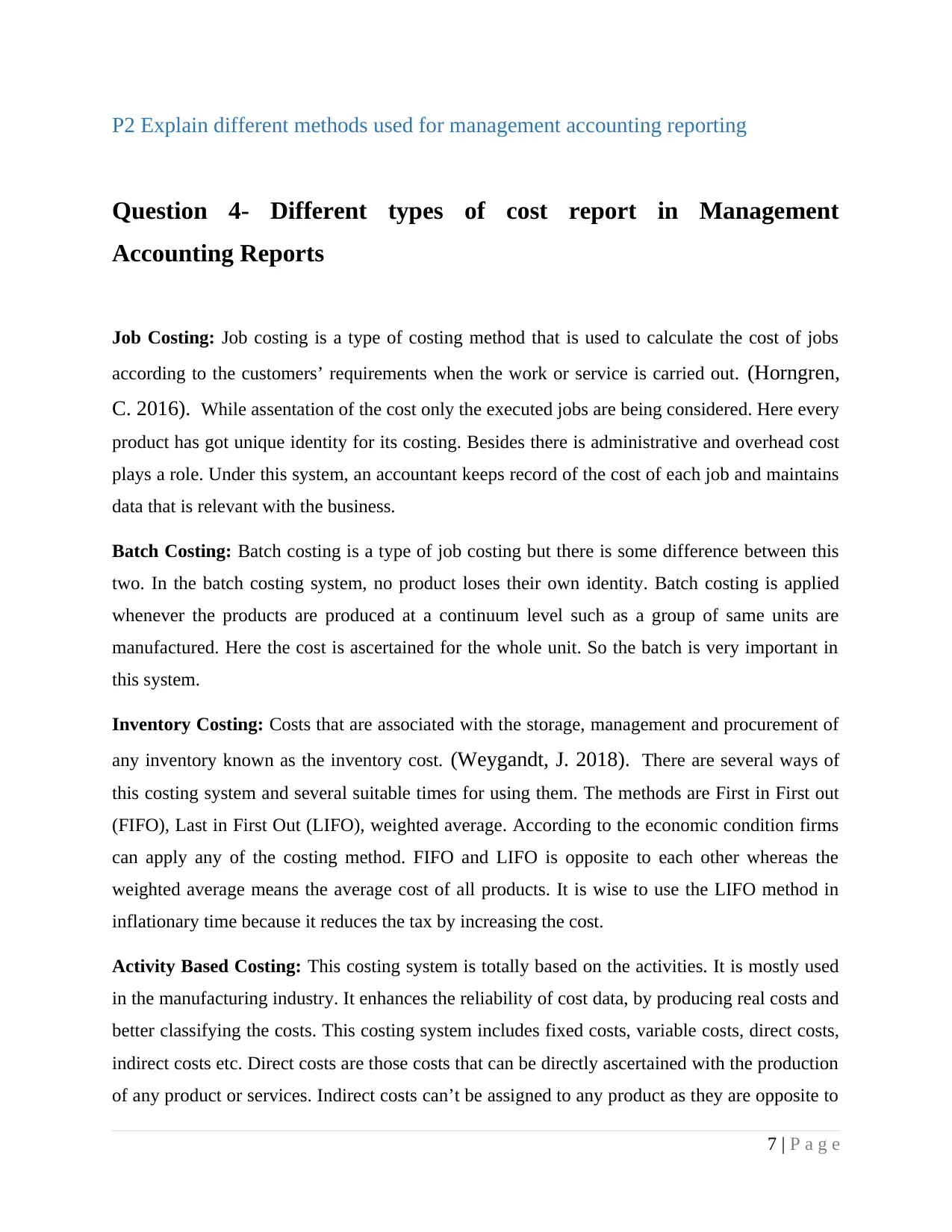
P2 Explain different methods used for management accounting reporting
Question 4- Different types of cost report in Management
Accounting Reports
Job Costing: Job costing is a type of costing method that is used to calculate the cost of jobs
according to the customers’ requirements when the work or service is carried out. (Horngren,
C. 2016). While assentation of the cost only the executed jobs are being considered. Here every
product has got unique identity for its costing. Besides there is administrative and overhead cost
plays a role. Under this system, an accountant keeps record of the cost of each job and maintains
data that is relevant with the business.
Batch Costing: Batch costing is a type of job costing but there is some difference between this
two. In the batch costing system, no product loses their own identity. Batch costing is applied
whenever the products are produced at a continuum level such as a group of same units are
manufactured. Here the cost is ascertained for the whole unit. So the batch is very important in
this system.
Inventory Costing: Costs that are associated with the storage, management and procurement of
any inventory known as the inventory cost. (Weygandt, J. 2018). There are several ways of
this costing system and several suitable times for using them. The methods are First in First out
(FIFO), Last in First Out (LIFO), weighted average. According to the economic condition firms
can apply any of the costing method. FIFO and LIFO is opposite to each other whereas the
weighted average means the average cost of all products. It is wise to use the LIFO method in
inflationary time because it reduces the tax by increasing the cost.
Activity Based Costing: This costing system is totally based on the activities. It is mostly used
in the manufacturing industry. It enhances the reliability of cost data, by producing real costs and
better classifying the costs. This costing system includes fixed costs, variable costs, direct costs,
indirect costs etc. Direct costs are those costs that can be directly ascertained with the production
of any product or services. Indirect costs can’t be assigned to any product as they are opposite to
7 | P a g e
Question 4- Different types of cost report in Management
Accounting Reports
Job Costing: Job costing is a type of costing method that is used to calculate the cost of jobs
according to the customers’ requirements when the work or service is carried out. (Horngren,
C. 2016). While assentation of the cost only the executed jobs are being considered. Here every
product has got unique identity for its costing. Besides there is administrative and overhead cost
plays a role. Under this system, an accountant keeps record of the cost of each job and maintains
data that is relevant with the business.
Batch Costing: Batch costing is a type of job costing but there is some difference between this
two. In the batch costing system, no product loses their own identity. Batch costing is applied
whenever the products are produced at a continuum level such as a group of same units are
manufactured. Here the cost is ascertained for the whole unit. So the batch is very important in
this system.
Inventory Costing: Costs that are associated with the storage, management and procurement of
any inventory known as the inventory cost. (Weygandt, J. 2018). There are several ways of
this costing system and several suitable times for using them. The methods are First in First out
(FIFO), Last in First Out (LIFO), weighted average. According to the economic condition firms
can apply any of the costing method. FIFO and LIFO is opposite to each other whereas the
weighted average means the average cost of all products. It is wise to use the LIFO method in
inflationary time because it reduces the tax by increasing the cost.
Activity Based Costing: This costing system is totally based on the activities. It is mostly used
in the manufacturing industry. It enhances the reliability of cost data, by producing real costs and
better classifying the costs. This costing system includes fixed costs, variable costs, direct costs,
indirect costs etc. Direct costs are those costs that can be directly ascertained with the production
of any product or services. Indirect costs can’t be assigned to any product as they are opposite to
7 | P a g e
⊘ This is a preview!⊘
Do you want full access?
Subscribe today to unlock all pages.

Trusted by 1+ million students worldwide
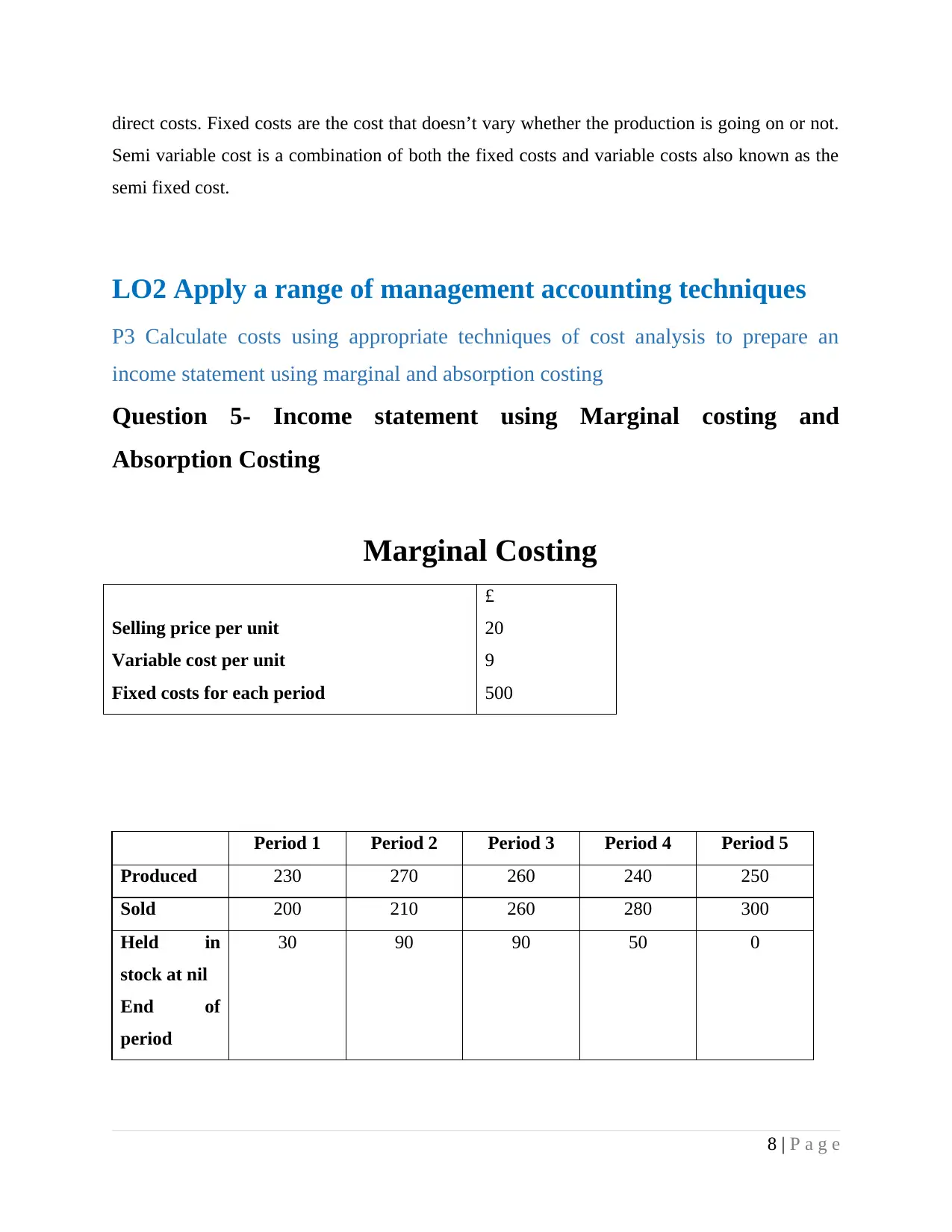
direct costs. Fixed costs are the cost that doesn’t vary whether the production is going on or not.
Semi variable cost is a combination of both the fixed costs and variable costs also known as the
semi fixed cost.
LO2 Apply a range of management accounting techniques
P3 Calculate costs using appropriate techniques of cost analysis to prepare an
income statement using marginal and absorption costing
Question 5- Income statement using Marginal costing and
Absorption Costing
Marginal Costing
Period 1 Period 2 Period 3 Period 4 Period 5
Produced 230 270 260 240 250
Sold 200 210 260 280 300
Held in
stock at nil
End of
period
30 90 90 50 0
8 | P a g e
Selling price per unit
Variable cost per unit
Fixed costs for each period
£
20
9
500
Semi variable cost is a combination of both the fixed costs and variable costs also known as the
semi fixed cost.
LO2 Apply a range of management accounting techniques
P3 Calculate costs using appropriate techniques of cost analysis to prepare an
income statement using marginal and absorption costing
Question 5- Income statement using Marginal costing and
Absorption Costing
Marginal Costing
Period 1 Period 2 Period 3 Period 4 Period 5
Produced 230 270 260 240 250
Sold 200 210 260 280 300
Held in
stock at nil
End of
period
30 90 90 50 0
8 | P a g e
Selling price per unit
Variable cost per unit
Fixed costs for each period
£
20
9
500
Paraphrase This Document
Need a fresh take? Get an instant paraphrase of this document with our AI Paraphraser
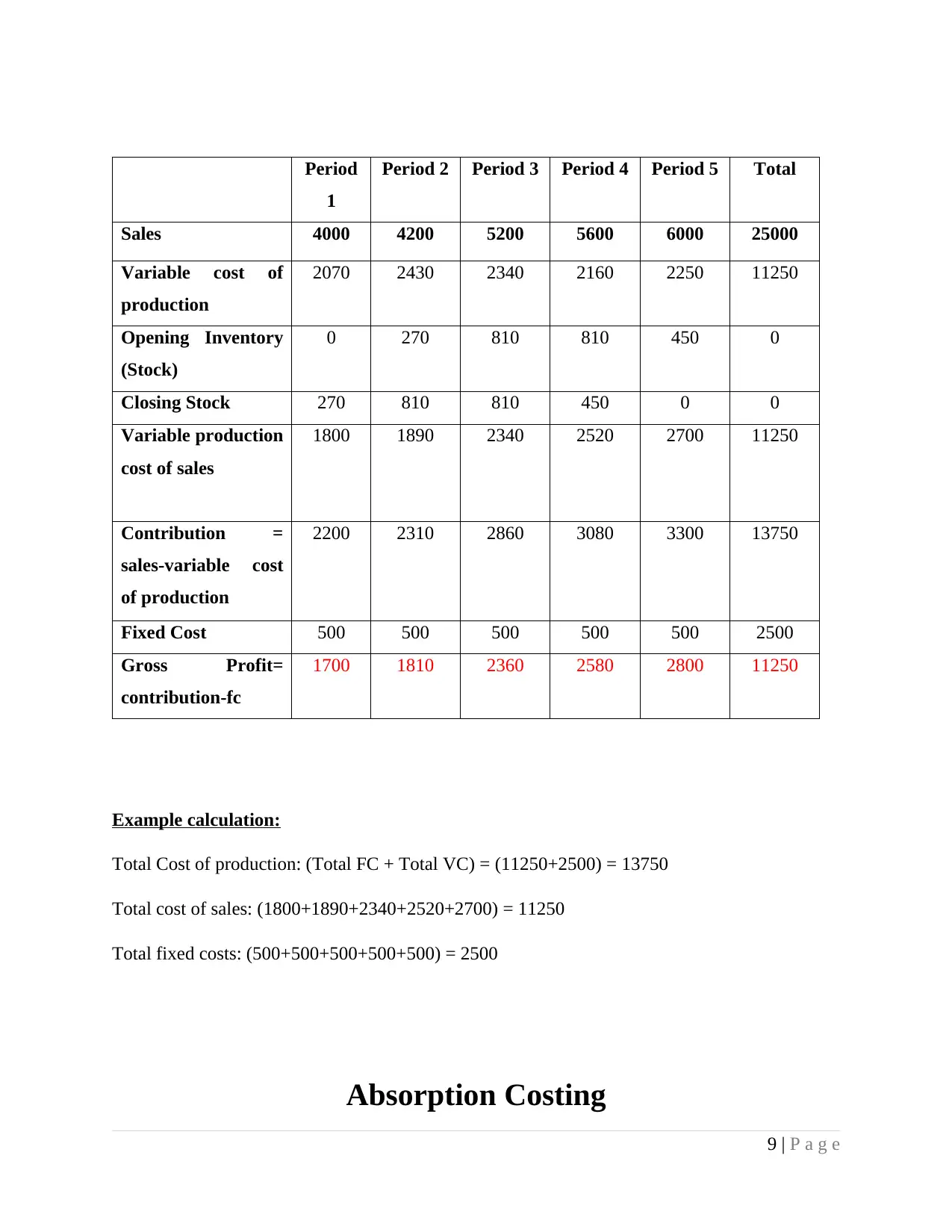
Period
1
Period 2 Period 3 Period 4 Period 5 Total
Sales 4000 4200 5200 5600 6000 25000
Variable cost of
production
2070 2430 2340 2160 2250 11250
Opening Inventory
(Stock)
0 270 810 810 450 0
Closing Stock 270 810 810 450 0 0
Variable production
cost of sales
1800 1890 2340 2520 2700 11250
Contribution =
sales-variable cost
of production
2200 2310 2860 3080 3300 13750
Fixed Cost 500 500 500 500 500 2500
Gross Profit=
contribution-fc
1700 1810 2360 2580 2800 11250
Example calculation:
Total Cost of production: (Total FC + Total VC) = (11250+2500) = 13750
Total cost of sales: (1800+1890+2340+2520+2700) = 11250
Total fixed costs: (500+500+500+500+500) = 2500
Absorption Costing
9 | P a g e
1
Period 2 Period 3 Period 4 Period 5 Total
Sales 4000 4200 5200 5600 6000 25000
Variable cost of
production
2070 2430 2340 2160 2250 11250
Opening Inventory
(Stock)
0 270 810 810 450 0
Closing Stock 270 810 810 450 0 0
Variable production
cost of sales
1800 1890 2340 2520 2700 11250
Contribution =
sales-variable cost
of production
2200 2310 2860 3080 3300 13750
Fixed Cost 500 500 500 500 500 2500
Gross Profit=
contribution-fc
1700 1810 2360 2580 2800 11250
Example calculation:
Total Cost of production: (Total FC + Total VC) = (11250+2500) = 13750
Total cost of sales: (1800+1890+2340+2520+2700) = 11250
Total fixed costs: (500+500+500+500+500) = 2500
Absorption Costing
9 | P a g e
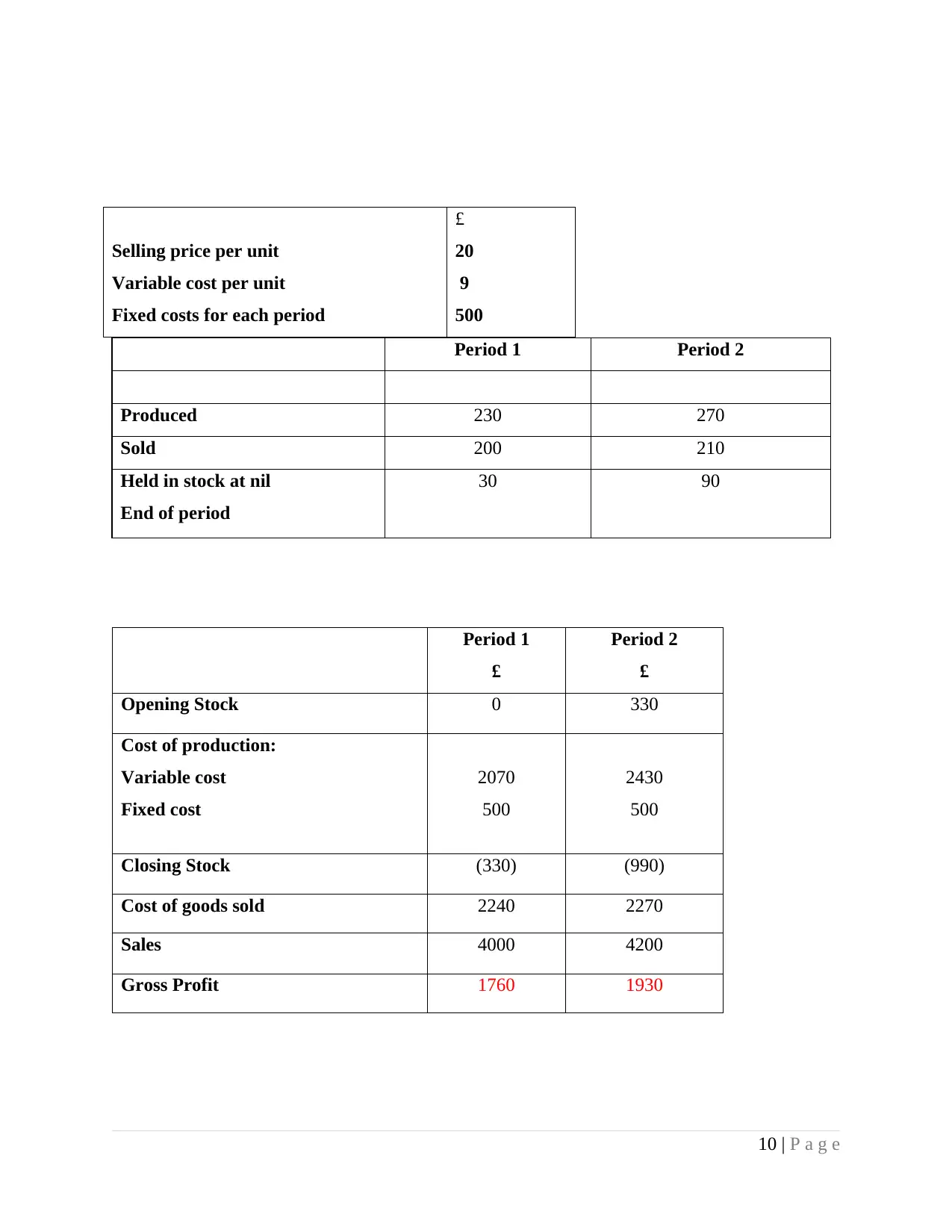
Period 1 Period 2
Produced 230 270
Sold 200 210
Held in stock at nil
End of period
30 90
Period 1
£
Period 2
£
Opening Stock 0 330
Cost of production:
Variable cost
Fixed cost
2070
500
2430
500
Closing Stock (330) (990)
Cost of goods sold 2240 2270
Sales 4000 4200
Gross Profit 1760 1930
10 | P a g e
Selling price per unit
Variable cost per unit
Fixed costs for each period
£
20
9
500
Produced 230 270
Sold 200 210
Held in stock at nil
End of period
30 90
Period 1
£
Period 2
£
Opening Stock 0 330
Cost of production:
Variable cost
Fixed cost
2070
500
2430
500
Closing Stock (330) (990)
Cost of goods sold 2240 2270
Sales 4000 4200
Gross Profit 1760 1930
10 | P a g e
Selling price per unit
Variable cost per unit
Fixed costs for each period
£
20
9
500
⊘ This is a preview!⊘
Do you want full access?
Subscribe today to unlock all pages.

Trusted by 1+ million students worldwide
1 out of 17
Related Documents
Your All-in-One AI-Powered Toolkit for Academic Success.
+13062052269
info@desklib.com
Available 24*7 on WhatsApp / Email
![[object Object]](/_next/static/media/star-bottom.7253800d.svg)
Unlock your academic potential
Copyright © 2020–2026 A2Z Services. All Rights Reserved. Developed and managed by ZUCOL.





